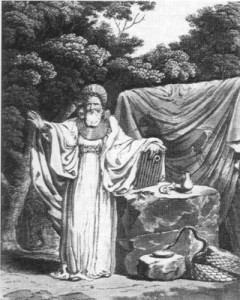The bard first appeared in the Strategic Review #6 (February 1976) in an article by Doug Schwegman and was conceived as a mixture of thief, magic-user, and fighter. These bards had thieving abilities equal to half their level, could wield any weapon (though limited in armor to chain and leather), had the hit probability (and saving throws) of clerics, could cast magic-user spells starting at 2nd level though advancement in spell-casting was slow (access to a new spell level every four levels, i.e. 2nd level spells at 6th level), had a special charm ability usable once per day, and had a special lore ability. Attribute requirements were "at least an average strength and intelligence" and "above average charisma", with a severe penalty to thieving abilities if dexterity were "below average".
Gary Gygax includes bards in AD&D but only as an optional class found in Appendix II of the Players Handbook, which described bards as a combination of fighters and thieves but also granted them druid (!) spells. In order to become a bard, a player-character would start as a fighter, attain 5th level, switch to being a thief, attain 5th level as a thief, then switch to being a druid at which point they were "actually bards and under druidical tutelage) before finally progressing to being a level 1 bard. Attribute requirements were at least 15 strength, wisdom, dexterity, and charisma, plus at least 12 intelligence and at least 10 constitution. Bards could fight as a fighter of the level attained and use thieving abilities as a thief of the level attained, while progressing in druid spells, a special charm ability, and a special lore ability, though they were limited to leather or magical chainmail armor and to a handful of weapons. The charm ability was triggered whenever the bard would sing and play, which also granted benefits to allies (morale, hit probability) and could counter a few monster abilities.
An article in Dragon Magazine #56, Singing a New Tune by Jeff Goetz, designed a new bard class with worse fighting ability (although using the to-hit table of a fighter), druid spells from level 1, and illusionist spells from level 5, while lacking any thief abilities. This version of the bard still had similar charm, lore, and related singing abilities. Ability score requirements were somewhat relaxed from the AD&D version.
The AD&D 2nd edition version of the bard grouped them together with thieves in the rogue category. The bard now had magic spells beginning at level 2, eventually attaining level 6 magic spells at 16th level. This bard had only a few thief abilities (climb walls, detect noise, pick pockets, and read languages), had a special lore ability, and through singing could influence reactions of NPCs (replacing the earlier charm ability), grant benefits to allies, and counter certain monster abilities. Ability score requirements were at least 12 dexterity, 13 intelligence, and 15 charisma.







![The Year of Incline [2014] Codex 2014](/forums/smiles/campaign_tags/campaign_incline2014.png)






























